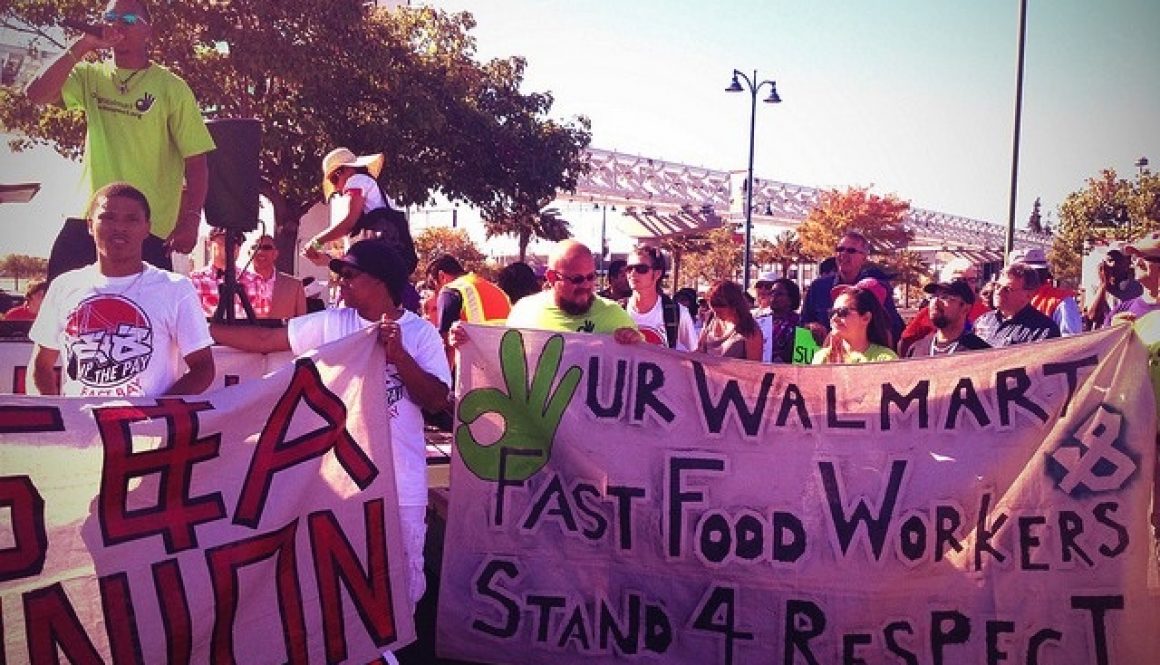Corporate Center Points Finger at Worker Centers
Last Wednesday, the U.S. Chamber of Commerce hosted an event called Shifting Tides: Worker Centers and a New Model of Representation, a live-streamed symposium to inform representatives from industry and government about how worker centers are empowering workers and communities, in an effort to coordinate weakening these centers’ ability to impact business practices. The event was put on by the Chamber’s Workforce Freedom Initiative. Apparently, companies hiding behind the veil of the Chamber and other business associations like the Orwellian-named Workforce Fairness Institute are the only voices qualified to decide what constitutes freedom and fairness in the workplace.
Out of the four guest speakers at Wednesday’s event, only one could be traced back to a specific company, and only from earlier in his career: Joe Kefauver, formerly an executive of Walmart and Darden Restaurants – both targets of worker center campaigns that educate the public about poor treatment of employees. Kefauver now heads Parquet “How do We Challenge the Social Justice Narrative?” Public Affairs, which is tied to another anonymous corporate front group, Worker Center Watch, and is a member of ALEC. The other guests included George Washington University Professor Jarol Manheim, who has a long history of opinions that favor of employers over union interests and who recently wrote a report for the Chamber; Stefan J. Marculewicz, a corporate lawyer; and Brian E. Hayes, a former Republican member of the National Labor Relations Board who once made the unprecedented threat to quit the NLRB so that it wouldn’t be able to achieve quorum.
Union representation and real wages are at historic lows, but Big Business still isn’t satisfied. Now it’s going after non-union worker centers, which offer new forms of advocacy for issues affecting workers in a time of high levels of insecurity for working families. Worker centers have for decades worked directly in communities to help people learn employment law and gain valuable job skills, positioning them to achieve employment with better wages and good job security. The newer iterations of worker centers though, are non-union organizations educating workers and the public on issues like poor working conditions within specific companies, as well as working with communities and companies to improve those conditions. The type of advocacy that has won tomato pickers a penny more per pound and restaurant workers a few days of paid sick leave per year is the function of worker centers by which the Chamber is most affronted.
In November 2013, the U.S. Chamber of Commerce breathlessly claimed that “well-financed” worker centers educating the public about working conditions of companies (such as those that fund the Chamber) were nothing more than union front groups. But the Chamber brought in $179 million in 2012 alone, and has spent more than $1 billion lobbying since 1998. Why is the elephant so scared of the mouse?
Not coincidentally, this Chamber event came three months after an historic agreement won by the Coalition of Immokalee Workers (CIW), which defines itself as “a worker-based human rights organization.” In January Walmart became the twelfth major food vendor, along with companies like Chipotle, Trader Joe’s, McDonald’s and more, to join the CIW’s Fair Food Program to pay agricultural workers an additional penny per pound of picked tomatoes and agree to other human rights improvements.
In its campaign against worker centers and similar nonprofits, the Chamber reveals itself to be dead set against public education regarding the industries that are the most challenging for workers. Groups targeted by the Chamber include Organization United for Respect at Walmart (OUR Walmart – “an independent, not-for-profit organization for hourly Associates” that vows not to represent Walmart employees in union bargaining), New York Communities for Change, Restaurant Opportunities Center (ROC- “a membership-based workers center”) and the CIW – groups fighting to expose conditions faced by Walmart workers, fast food workers, restaurant workers (mostly of large restaurant chains), and immigrant farm laborers respectively. As the Chamber continues to allege these centers represent workers without defining themselves as unions – with little acknowledgment of the public education function they play – at least many of the backers of these groups are publicly known (some are unions; others are foundations). In fact, during the Chamber’s Wednesday event, the chief of staff of U.S. Rep. Steve King (R-Iowa) asked, “Is there something on Capitol Hill we could be doing, not about worker centers, but about progressive foundations, which are funding them in the first place?”
This is another issue area in which companies are using groups like the Chamber to grandstand and push back against workers in a way that won’t reflect poorly on the companies themselves.
Sam Jewler is the communications officer for Public Citizen’s U.S. Chamber Watch program. Follow U.S. Chamber Watch on Twitter at @USChamberWatch
Photo: Steve Rhodes/Flickr Creative Commons

